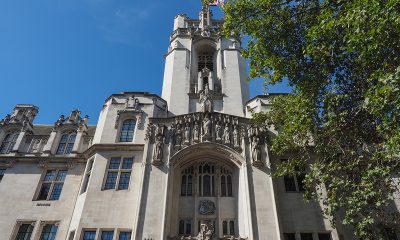National
Meet the trans editor covering Major League Baseball
Bobbie Dittmeier combines dual passions for sports, journalism

A day at the office at MLB.com for Bobbie Dittmeier is just about the same for her as it is for other editors working to produce news stories on developments in Major League Baseball.
Upon coming to the New York office, she’ll speak with the copy chief about potential articles for the day with other editors, who will then assign the stories to reporters.
“We have a lot of stories coming in everyday,” Dittmeier says. “We have 30 different reporters plus other columnists, part-timers and interns. We have a lot of writers for our staff. We cover all 30 teams full time. So, there’s a lot of copy that comes into the desk every day.”
FIND MORE OF THE WASHINGTON BLADE SPORTS ISSUE HERE.
The big news in recent weeks? The biogenesis investigation, which has led to the suspension of several players, including New York Yankees third baseman Alex Rodriguez.
“Waiting for the news on Alex Rodriguez is like waiting for your wife to go into labor,” she says. “You got the bags packed and the cars gassed, and you’re just going about your regular routine waiting for the pager to go off. And knowing that when the pager does go off that the next 12 to 18 hours is going to be crazy.”
But Dittmeier, who spoke to the Washington Blade earlier this month, is unique among other editors and baseball enthusiasts working at MLB.com: She’s transgender and the only openly LGBT person on staff at the site.
Dittmeier says being the only openly transgender person on staff hasn’t been an issue on the job, which she attributes to changing attitudes over time and her own job performance.
“I think the most significant part of it is that I have a lot of experience and I do good work, if I may say so myself,” Dittmeier says. “And I think that the people I work for value that. They certainly didn’t want to throw me out of the office for being transgender.”
One exception to the acceptance she’s found was what Dittmeier calls a “blip” among two individuals upon her announcement she would transition. Reluctant to go into detail, she characterizes it as more of a misunderstanding and says neither of those people works at MLB.com any longer.
In 2007, after working for MLB.com for six years, Dittmeier announced she would transition from male to female. She had already married and had a child. And it wasn’t her first attempt; she made an earlier attempt at transitioning in the 1990s.
“It was really only after I had been at MLB for a number of years that I felt comfortable and confident enough that transition wasn’t going to put me on the street,” Dittmeier said. “So, I felt I had job security, I knew the people I worked for, I knew that they knew I do a good job, that I’m good at what I do, so I didn’t think it would be that much of an issue. So, I worked toward it for a couple years, starting probably around 2005, and then finally culminating in coming out at work in 2007.”
Dittmeier says she “always kind of felt something different” about her when she was growing up in Long Island during her youth, but wasn’t at the time able to identify it because of a lack of information.
“I kind of figured it out in my teens, but you don’t act upon it because, again, it was a different time,” Dittmeier says. “You didn’t know if you were going to be ostracized from your family, you didn’t have the resources, you certainly didn’t have the Internet. Going to a shrink was really frowned upon. You certainly didn’t talk about these things with your parents.”
At the same time growing up, Dittmeier was an avid enthusiast of all things baseball and newsprint. After school, she would read the sports columns in Newsday, a Pulitzer Prize-winning paper that was distributed in her hometown.
“And it was an afternoon paper, so it would come to the house during the day, and I would come home from school, and the first thing I would do before I went out to play ball was I would make myself a sandwich and I would read the newspaper, then I would go out and play ball,” Dittmeier says. “So, I always loved journalism. I always loved writing.”
Dittmeier started in the business of sports writing as a beat reporter covering hockey and horseracing, mostly in Westchester County just outside of New York, and then in Albany for a number of years. She wanted to get involved in baseball, but didn’t have the opportunity. Landing the job at MLB.com 12 years ago made that dream come true.
One recent big news story hit close to home. In July, Major League Baseball announced that it had adopted an employment non-discrimination policy prohibiting discrimination based on sexual orientation. Dittmeier says she didn’t cover the story personally, although MLB.com had a reporter, Paul Hagen, covering it.
“Personally, it doesn’t impact me at all, I don’t think,” Dittmeier says. “But I’m certainly glad to see Major League Baseball take it to that level and respond like that. I think that’s more for clubhouses, players, the teams more than me.”
The policy doesn’t cover gender identity, but Dittmeier isn’t discouraged. New York City, where she lives and works, has employment non-discrimination protections based on gender identity.
“It’s not troubling for me personally,” Dittmeier says. “It would be nice if they took a look at that. But again, for me, personally I don’t think that I’m at any kind of risk as long as I’m doing my job well. If I don’t do my job well, then I’m subject to changes just like everybody else. If it’s not there, it would be nice if they would include it, I’m sure.”
Asked about the prevalence of gay players in Major League Baseball, Dittmeier insists there are such players who haven’t made their sexual orientation or gender identity public yet.
“There has to be,” Dittmeier says. “I remember having a debate with a hockey coach years and years ago who insisted there were no gay players anywhere in professional hockey, and I told him I thought that was ridiculous. If the number is 10 percent of the population is gay, then there has to be.”
But even with the MLB’s non-discrimination policy on sexual orientation in place, Dittmeier says it would take a player with exceptional skills to come out as gay — more talent than what an average baseball player normally has.
“If you are hitting 300 and you’re a perennial all-star, and you happen to be [gay, bi or trans], your chances of successfully coming out are pretty good,” Dittmeier says. “If you’re going up and down between Triple-A and the major leagues, that’s a tough one, because if it comes down to a decision between that player and someone else as to whether they’re going to make the roster, then you have to worry about someone, consciously or unconsciously, choosing the other player because of your sexual orientation.”
Although he’s not a baseball player, the most notable coming out of a gay athlete this year was former Washington Wizards center Jason Collins. It’s his status as a veteran that Dittmeier says made that coming out possible.
“He’s 34 years old,” Dittmeier says. “He’s a good ball player at this point in his career. If, for some reason, he discontinues to play, he’s had a pretty good career. So he doesn’t have very much to lose. When he was 23, 24, 25 years old, he certainly had a lot more to lose than he does now. I think security is really, really important.”
Dittmeier says she’s seen attitudes change positively in recent decades, and expects those to change even further as time progresses — particularly for transgender people like herself.
“I know most people don’t know someone who is transgender, but certainly most people know someone else who’s LGBT,” Dittmeier says. “And 20 years ago, I don’t think you could say that. Once you know someone, either someone in your life or someone you get to know, someone they work with or whatever, they understand it better. I guess that’s probably like with anything in life.”
CORRECTIONS: An earlier version of this article misspelled the name of MLB.com reporter Paul Hagen. It was also incorrect about the position that Alex Rodriguez currently plays and Dittmeier’s hometown. The article has also been updated to clarify that New York City has transgender non-discrimination protections. The Blade regrets the errors.
State Department
HIV/AIDS activists protest at State Department, demand full PEPFAR funding restoration
Black coffins placed in front of Harry S. Truman Building

Dozens of HIV/AIDS activists on Thursday gathered in front of the State Department and demanded the Trump-Vance administration fully restore President’s Emergency Plan for AIDS Relief funding.
Housing Works CEO Charles King, Health GAP Executive Director Asia Russell, Human Rights Campaign Senior Public Policy Advocate Matthew Rose, and others placed 206 black Styrofoam coffins in front of the State Department before the protest began.
King said more than an estimated 100,000 people with HIV/AIDS will die this year if PEPFAR funding is not fully restored.
“If we continue to not provide the PEPFAR funding to people living in low-income countries who are living with HIV or at risk, we are going to see millions and millions of deaths as well as millions of new infections,” added King.
Then-President George W. Bush in 2003 signed legislation that created PEPFAR.
The Trump-Vance administration in January froze nearly all U.S. foreign aid spending for at least 90 days. Secretary of State Marco Rubio later issued a waiver that allows the President’s Emergency Plan for AIDS relief and other “life-saving humanitarian assistance” programs to continue to operate during the freeze.
The Washington Blade has previously reported PEPFAR-funded programs in Kenya and other African countries have been forced to suspend services and even shut down because of a lack of U.S. funding. Two South African organizations — OUT LGBT Well-being and Access Chapter 2 — that received PEPFAR funding through the U.S. Agency for International Development and the Centers for Disease Control and Prevention in recent weeks closed down HIV-prevention programs and other services to men who have sex with men.
Rubio last month said 83 percent of USAID contracts have been cancelled. He noted the State Department will administer those that remain in place “more effectively.”
“PEPFAR represents the best of us, the dignity of our country, of our people, of our shared humanity,” said Rose.
Russell described Rubio as “ignorant and incompetent” and said “he should be fired.”
“What secretary of state in 90 days could dismantle what the brilliance of AIDS activism created side-by-side with George W. Bush? What kind of fool could do that? I’ll tell you who, the boss who sits in the Harry S. Truman Building, Marco Rubio,” said Russell.

U.S. Military/Pentagon
Pentagon urged to reverse Naval Academy book ban
Hundreds of titles discussing race, gender, and sexuality pulled from library shelves

Lambda Legal and the Legal Defense Fund issued a letter on Tuesday urging U.S. Defense Secretary Pete Hegseth to reverse course on a policy that led to the removal of 381 books from the Nimitz Library of the U.S. Naval Academy in Annapolis, Md.
Pursuant to President Donald Trump’s executive order 14190, “Ending Radical Indoctrination in K-12 Schooling,” the institution screened 900 titles to identify works promoting “diversity, equity, and inclusion,” removing those that concerned or touched upon “topics pertaining to the experiences of people of color, especially Black people, and/or LGBTQ people,” according to a press release from the civil rights organizations.
These included “I Know Why the Caged Bird Sings” by Maya Angelou, “Stone Fruit” by Lee Lai, “The Hate U Give” by Angie Thomas, “Lies My Teacher Told Me: Everything Your American History Textbook Got Wrong” by James W. Loewen, “Gender Queer: A Memoir” by Maia Kobabe, and “Democracy in Black: How Race Still Enslaves the American Soul” by Eddie S. Glaude, Jr.
The groups further noted that “the collection retained other books with messages and themes that privilege certain races and religions over others, including ‘The Clansman: A Historical Romance of the Ku Klux Klan’ by Thomas Dixon, Jr., ‘Mein Kampf’ by Adolf Hitler, and ‘Heart of Darkness’ by Joseph Conrad.
In their letter, Lambda Legal and LDF argued the books must be returned to circulation to preserve the “constitutional rights” of cadets at the institution, warning of the “danger” that comes with “censoring materials based on viewpoints disfavored by the current administration.”
“Such censorship is especially dangerous in an educational setting, where critical inquiry, intellectual diversity, and exposure to a wide array of perspectives are necessary to educate future citizen-leaders,” Lambda Legal Chief Legal Officer Jennifer C. Pizer and LDF Director of Strategic Initiatives Jin Hee Lee said in the press release.
Federal Government
White House sues Maine for refusing to comply with trans athlete ban
Lawsuit follows months-long conflict over school sports in state

The Justice Department is suing the state of Maine for refusing to comply with President Donald Trump’s executive order banning transgender athletes from participating in school sports, U.S. Attorney General Pam Bondi announced on Wednesday.
DOJ’s lawsuit accuses the state of violating Title IX rules barring sex discrimination, arguing that girls and women are disadvantaged in sports and deprived of opportunities like scholarships when they must compete against natal males, an interpretation of the statute that reverses course from how the law was enforced under the Biden-Harris administration.
“We tried to get Maine to comply” before filing the complaint, Bondi said during a news conference. She added the department is asking the court to “have the titles return to the young women who rightfully won these sports” and may also retroactively pull federal funding to the state for refusing to comply with the ban in the past.
Earlier this year, the attorney general sent letters to Maine, California, and Minnesota warning the blue states that the department “does not tolerate state officials who ignore federal law.”
According to the Maine Principals’ Association, only two trans high school-aged girls are competing statewide this year. Conclusions from research on the athletic performance of trans athletes vis-a-vis their cisgender counterparts have been mixed.
Trump critics and LGBTQ advocates maintain that efforts to enforce the ban can facilitate invasive gender policing to settle questions about an individual athlete’s birth sex, which puts all girls and women at risk. Others believe determinations about eligibility should be made not by the federal government but by school districts, states, and athletics associations.
Bondi’s announcement marked the latest escalation of a months-long feud between Trump and Maine, which began in February when the state’s Democratic governor, Janet Mills, declined to say she would enforce the ban.
Also on Wednesday, U.S. Education Secretary Linda McMahon said the findings from her department’s Title IX investigation into Maine schools — which, likewise, concerned their inclusion of trans student-athletes in competitive sports — was referred to DOJ.
Earlier this month, the Justice Department pulled $1.5 million in grants for Maine’s Department of Corrections because a trans woman was placed in a women’s correctional facility in violation of a different anti-trans executive order, while the U.S. Department of Agriculture paused the disbursement of funds supporting education programs in the state over its failure to comply with Title IX rules.
A federal court last week ordered USDA to unfreeze the money in a ruling that prohibits the agency from “terminating, freezing, or otherwise interfering with the state’s access to federal funds based on alleged Title IX violations without following the process required by federal statute.”
-

 District of Columbia5 days ago
District of Columbia5 days agoFinal push to raise funds, fill D.C. hotels as WorldPride nears
-

 El Salvador3 days ago
El Salvador3 days agoGay Venezuelan makeup artist remains in El Salvador mega prison
-

 District of Columbia4 days ago
District of Columbia4 days agoReenactment of 1965 gay rights protest at White House set for April 17
-

 Maryland5 days ago
Maryland5 days agoFreeState Justice: Transgender activist ‘hijacked’ Moore’s Transgender Day of Visibility event












